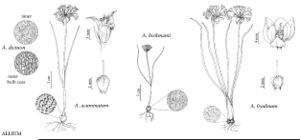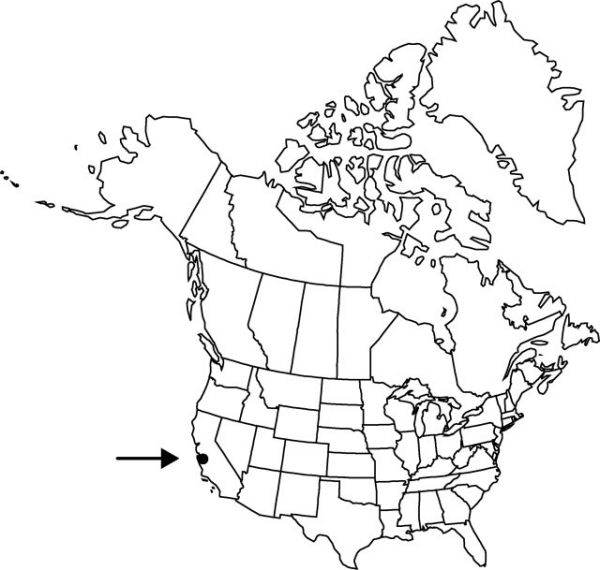Allium hickmanii
Bull. Torrey Bot. Club 30: 483. 1903.
Bulbs 1–5+, not clustered on stout primary rhizome, increase bulbs absent or ± equaling parent bulbs, never appearing as basal cluster, ovoid to ± globose, 0.8–1.2 × 0.7–1.2 cm; outer coats enclosing 1 or more bulbs, gray to gray-brown, prominently cellular-reticulate, membranous, cells arranged in ± vertical rows, forming irregular herringbone pattern, transversely elongate, wavy, V-shaped, without fibers; inner coats white, cells obscure, ± quadrate. Leaves persistent, withering from tip by anthesis, 2, basally sheathing, sheaths not extending much above soil level; blades solid, subterete, 3–20 cm × 0.5–1 mm, margins entire. Scape persistent, solitary, erect, solid, terete, (3–)5–15(–17) cm × 0.5–2 mm. Umbel persistent, erect, compact, 4–15-flowered, hemispheric, bulbils unknown; spathe bracts persistent, 2, 3–5-veined, broadly ovate, ± equal, apex mucronate. Flowers campanulate, 5–7 mm; tepals erect, white to pale pink, lanceolate to lance-ovate, ± equal, becoming papery in fruit and remaining erect, margins entire, apex acute or obtuse, becoming ± involute at tip and appearing short-acuminate; stamens included; anthers white; pollen white; ovary crested or crestless; processes 3, central, rounded, very minute, margins entire; style linear, equaling stamens; stigma capitate, scarcely thickened, unlobed; pedicel 4–12 mm. Seed coat dull; cells minutely roughened. 2n = 14.
Phenology: Flowering Mar–May.
Habitat: Grassy, wooded slopes and flats
Elevation: 0–50 m
Discussion
Of conservation concern.
Allium hickmanii is a rare endemic of the Monterey Peninsula and Arroyo de la Cruz.
Selected References
None.

